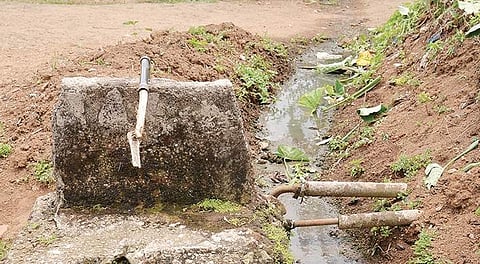

IDUKKI: As darkness starts to fade in the early morning over the lush green tea gardens in Idukki, one notices men and women sauntering through the bushes. These people are not out for a scenic tour of the picturesque surroundings but are scouting for a suitable spot to defecate.
Roslin, 27, who is six months pregnant, is one among the 1,500 labourers working at a local tea estate at Peermade in Idukki, who prefer open defecation in the tea gardens. Her single-room brick house, plastered with mud and cow dung, does not have a toilet or bathroom and so she is forced to defecate in the outside.
This is the accepted practice in many other tea gardens in Idukki. Roslin said defecation is already a strenuous procedure for her during this time. “Doing it in the open adds to my problem. I am always afraid of causing any health issues to my child due to poor sanitation, but I have no other option,” she said. The district is known around the world for its tea and it has 38-odd estates (it used to be more than 100 earlier, but was reduced to the present number when the majority got amalgamated) and 4,901 smaller tea gardens. Idukki contributes 72.40 per cent of the state’s annual tea production of about 56.63 million kg.
Yet, these areas are also home to poor nutrition and abysmal health conditions, especially among workers. Of the 21,246 labourers working at various tea estates across the district, 5,432 are employed in the Peermade Block having 23 estates with more than fifty per cent of the work force being women. Most plantations here have no toilets, no drinking water and no running water. Workers are forced to defecate in the tea bushes and have no way to wash before they go back to picking.
About 11 km from Peermade, the workers of one tea company and another well-known tea estate have similar grievances. Pushpam, 58, a permanent worker at the well-known estate in Vandiperiyar, said without a toilet and water facility, the women here are forced to defecate amid the tea bushes.
“Except our complaints piling up at the estate office, nothing has happened. There have been cases when a woman who went to defecate outside at night was bitten by a snake. Besides, the chances of being attacked by wild animals, including elephants, too are higher. We live here by mortgaging our life to the almighty,” she said.
Kokila Murukan, a worker at the Ladram division of Bethel Tea Estate, said, “If it is monsoon, we will have water from the streams running through the plantation to wash our hands after relieving ourselves. But in summer the streams run dry, hence we will have to go back to picking without washing our hands. No authority has arrived here to solve our pathetic situation,” she said.
According to Martin Jayaraj, inspector of plantations at Labour Office, Udumbanchola block, the Plantations Labour Act of 1951 mandates certain basic provisions be offered to workers, including drinking water, separate toilets for men and women, housing and medical services.“But the law does little to guarantee even these basic rights for most of the tea pickers. Several times I have filed prosecution at the court regarding the plantation workers’ issue, but the companies are not at all bothered about it. They go on with paying the fine proposed by the court,” he said.
Without action from plantation owners and the government, rights activists and tea workers worry nothing will improve. The government declared Kerala as open defecation free (ODF) as part of the Swachh Bharat Mission in 2016, but in the case of people living in the plantation sector in Idukki district, this claim may only be partially true as a majority of the residents here still opt for open defecation. And this is a crisis existing in both running and closed plantations.
According to Saju Sebastian, District Coordinator, Suchitwa Mission, efforts have been made to construct public toilets at various locations across Peermade Taluk in connection with the ODF project of the Central Government. But constructing individual toilets for each house is not a possible thing as the responsibility rests with the tea companies.“It is the company management that should take necessary action,” he said.
District Collector G R Gokul said sanitation problem is not widely prevalent in Devikulam tea estate areas as he has taken all necessary measures to provide all supporting facilities to the tea workers.“It might have been prevalent in other blocks. The administration will take necessary steps to overcome the issue. The plantation owners are obliged by law to provide and maintain adequate houses and toilets for workers. If they do not provide it, we will deal with it legally to find a solution,” he said.
However, some officers concerned say the tea company is doing all it can to solve the issue. One officer said every year the estate builds a few new toilets and repairs old ones in workers’ homes. “But workers are habituated to defecating in the open. They don’t use them.” When asked about the lack of toilets for workers out in the fields, they justified it saying “Putting toilets in the field is impossible. If we start doing that we will have to build 100-200 toilets. We are helpless.”